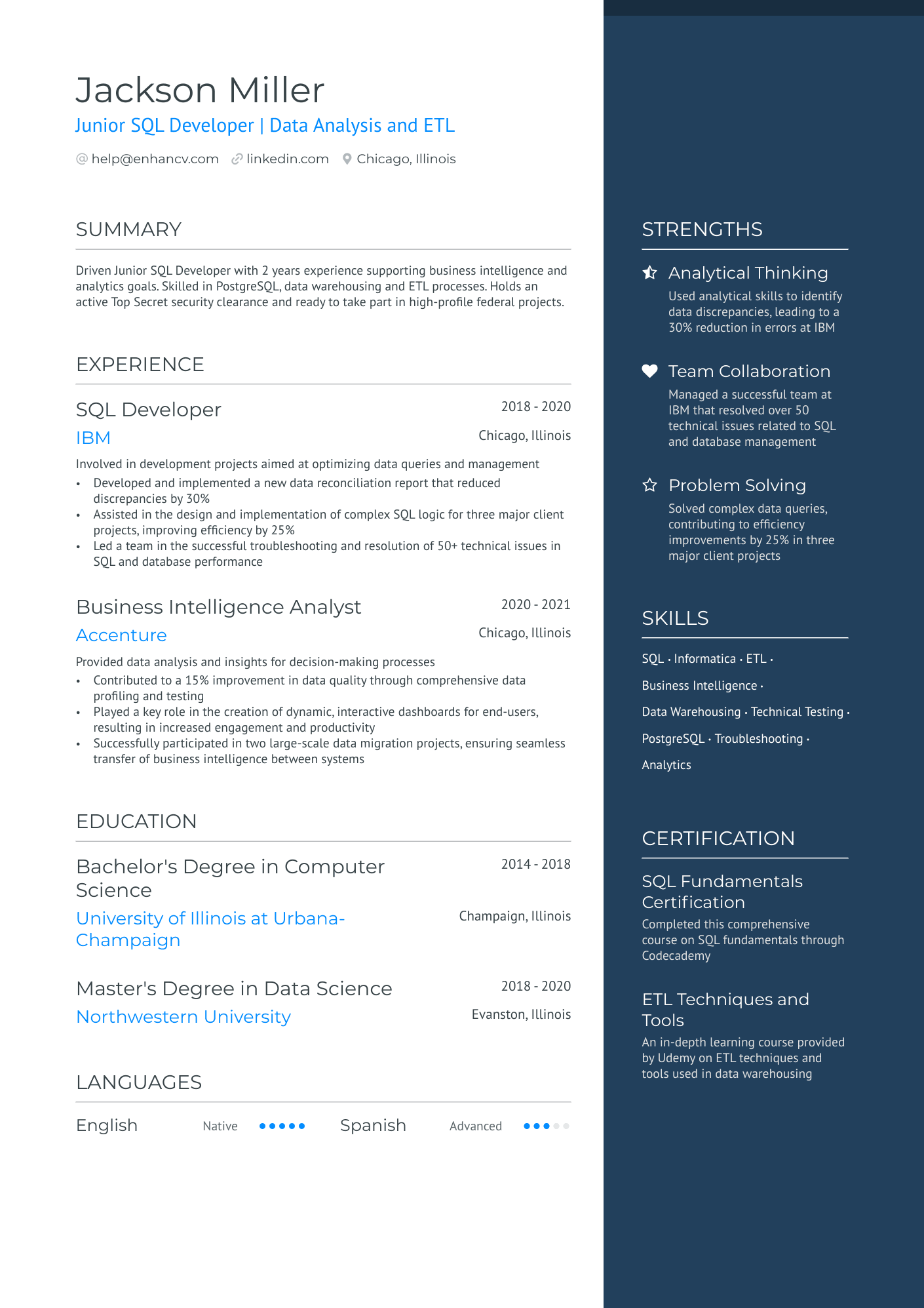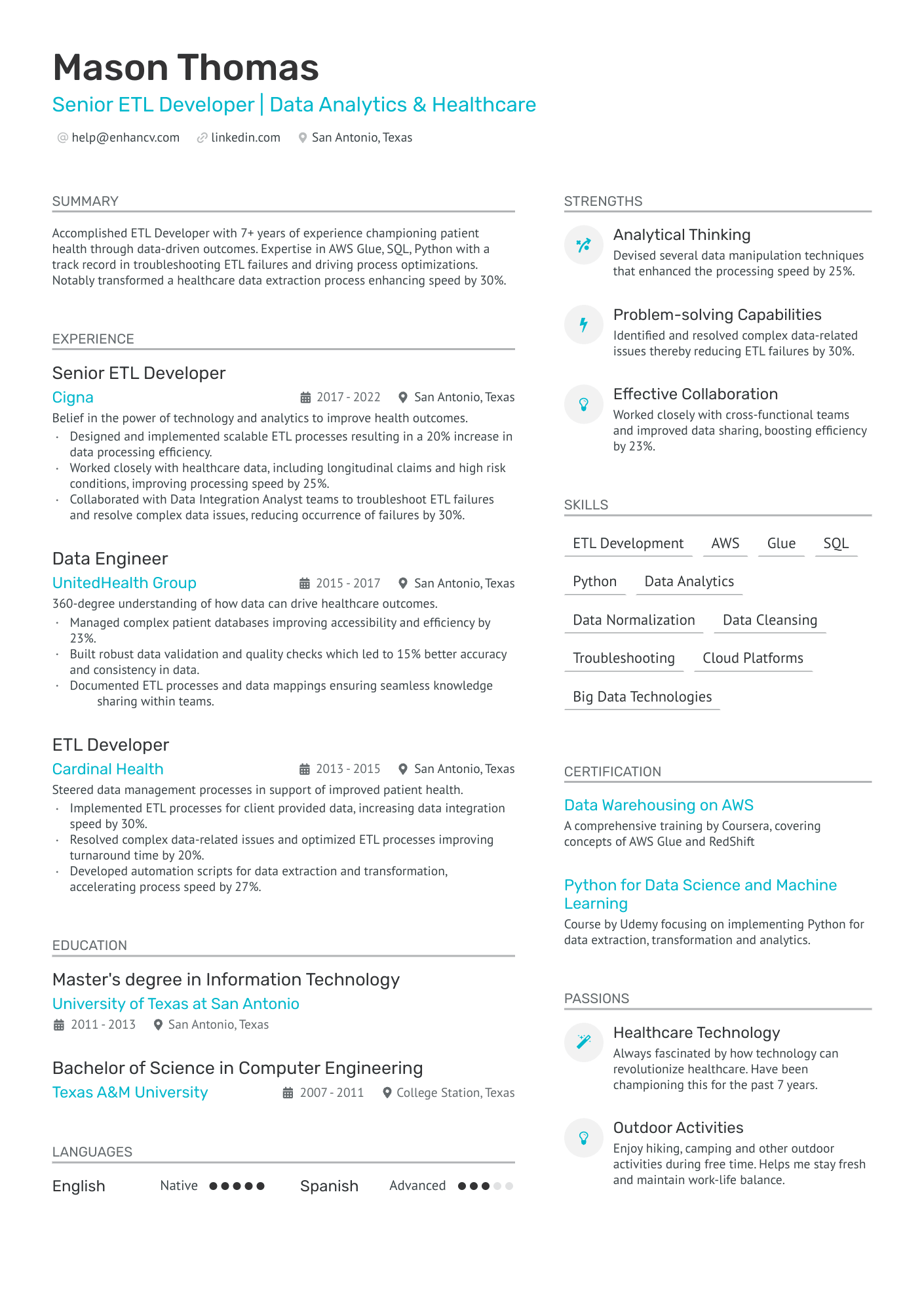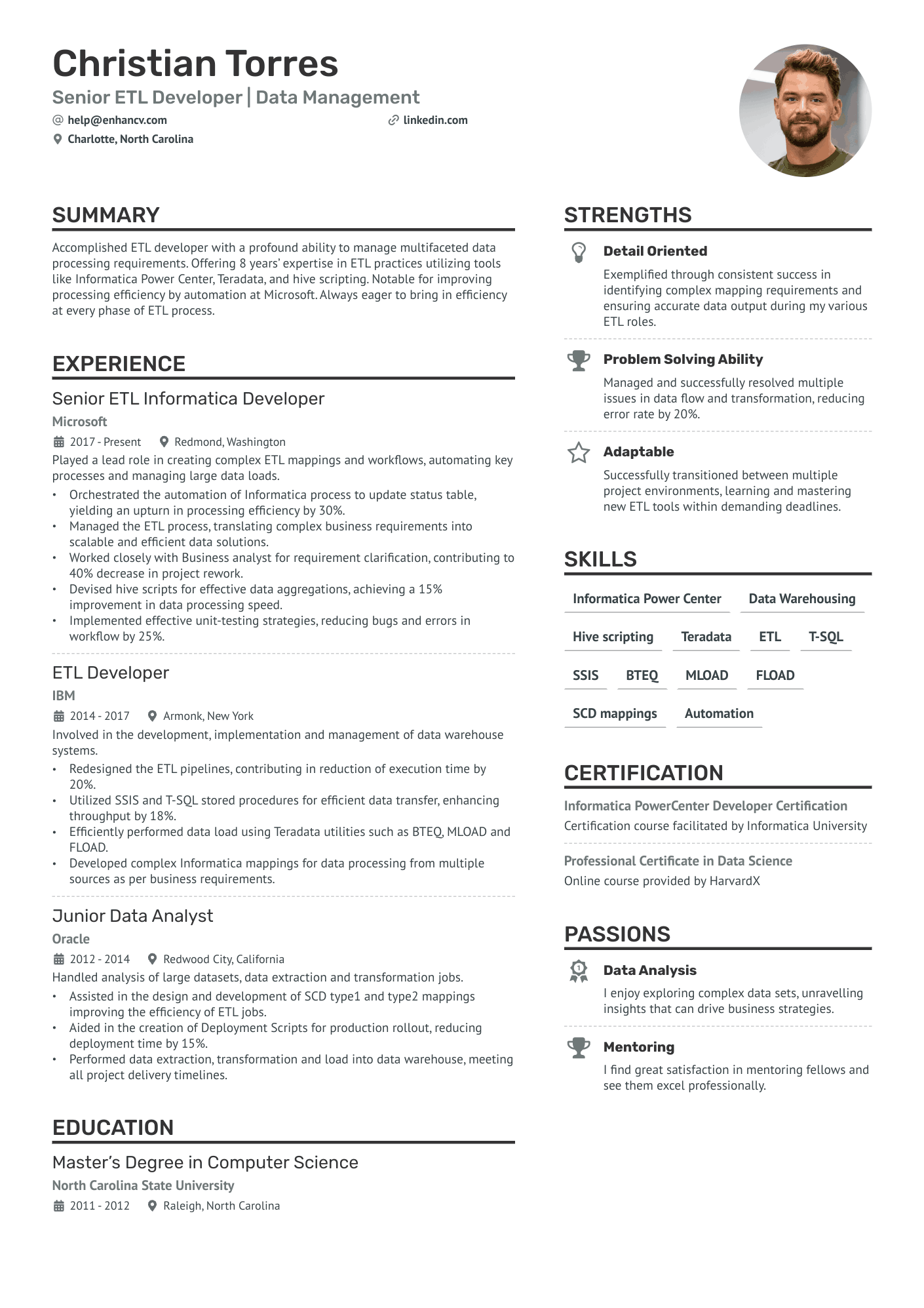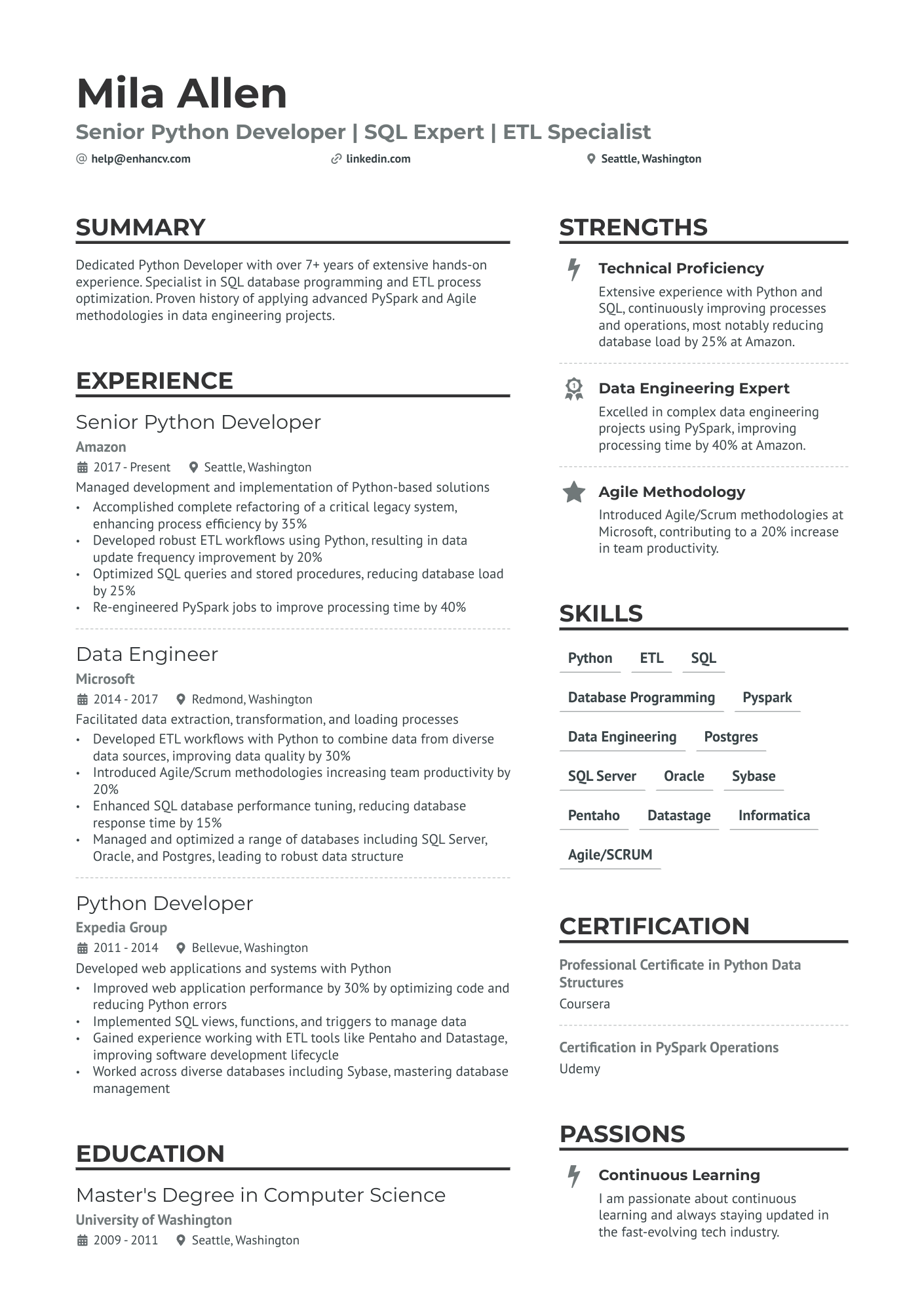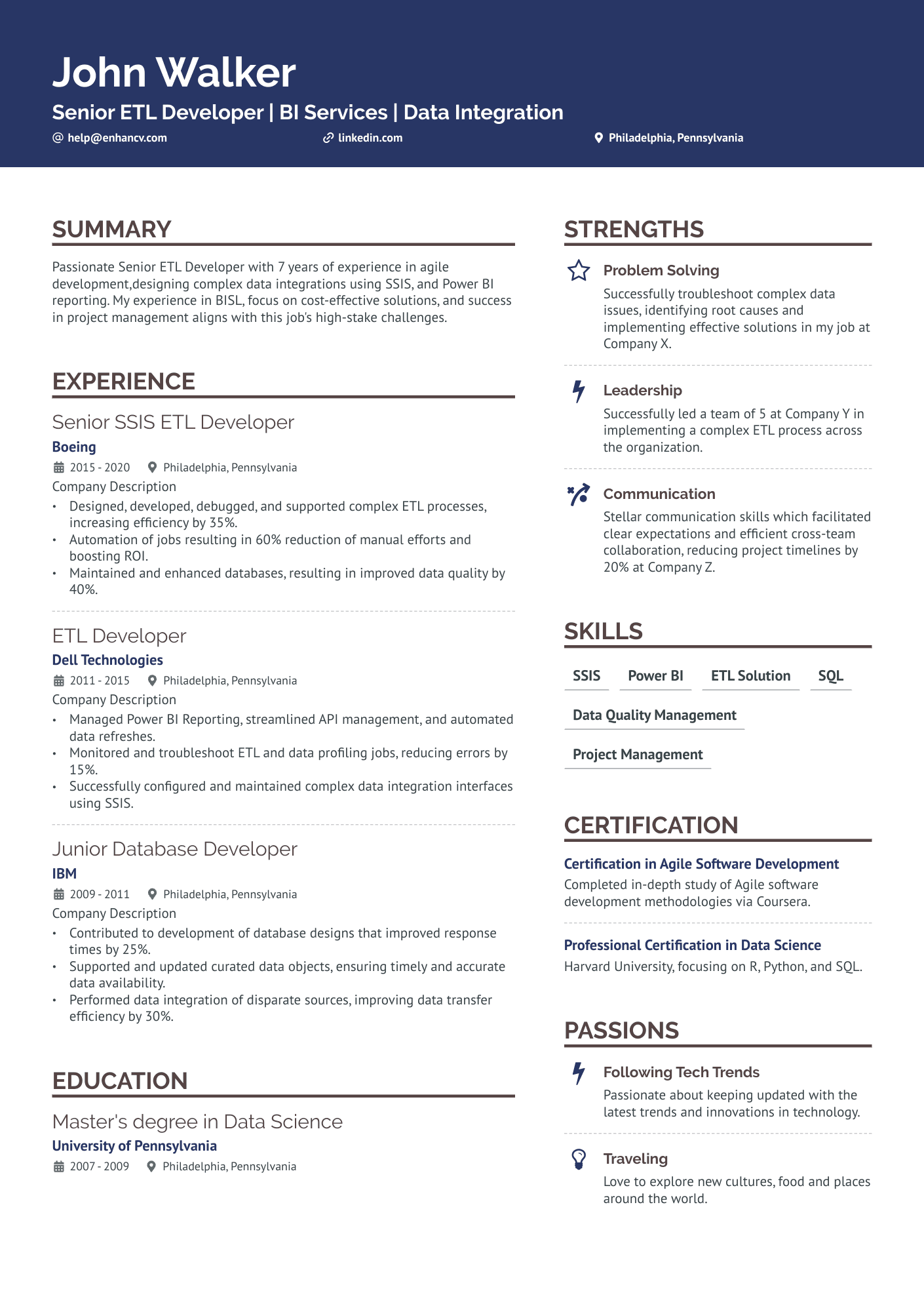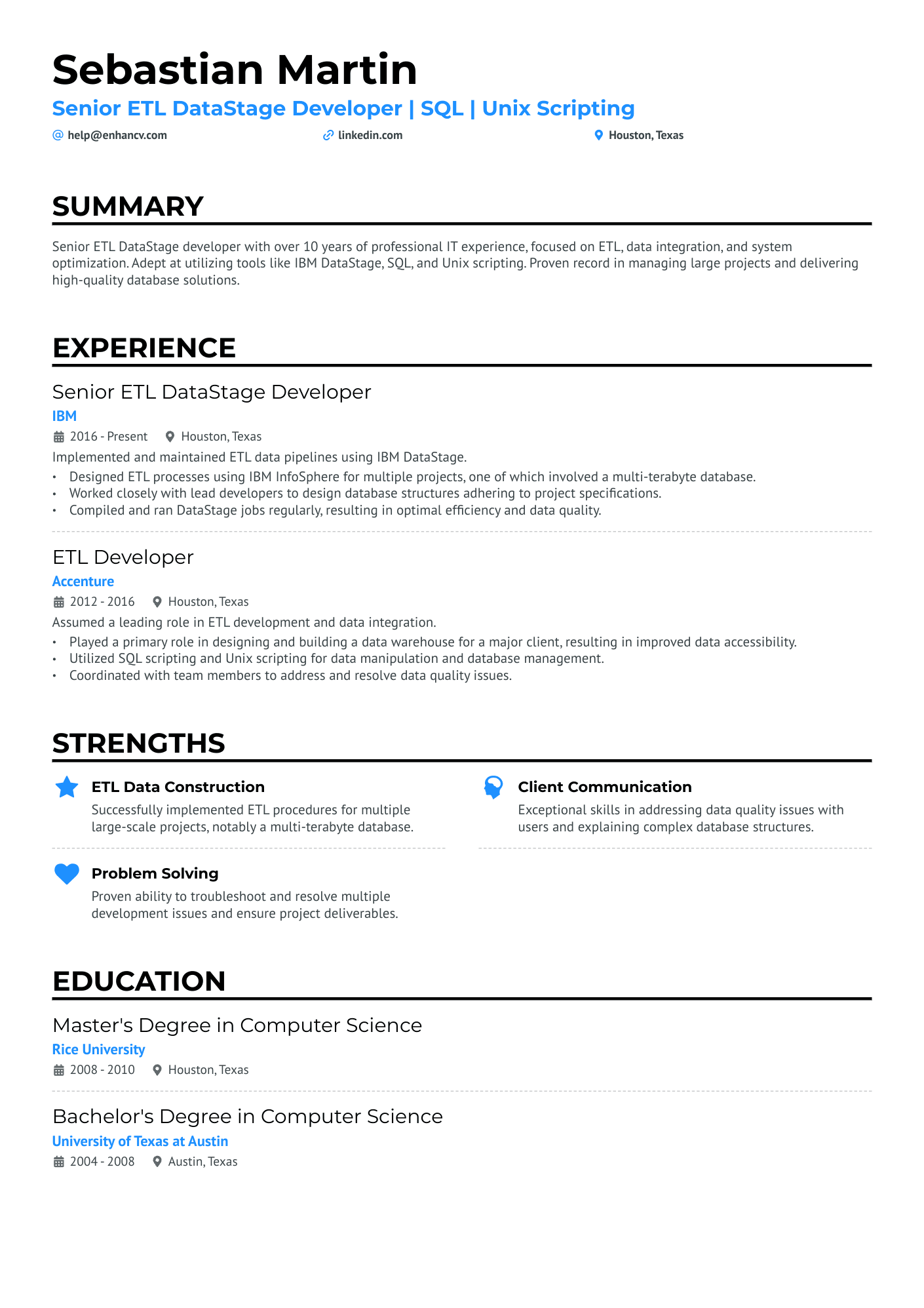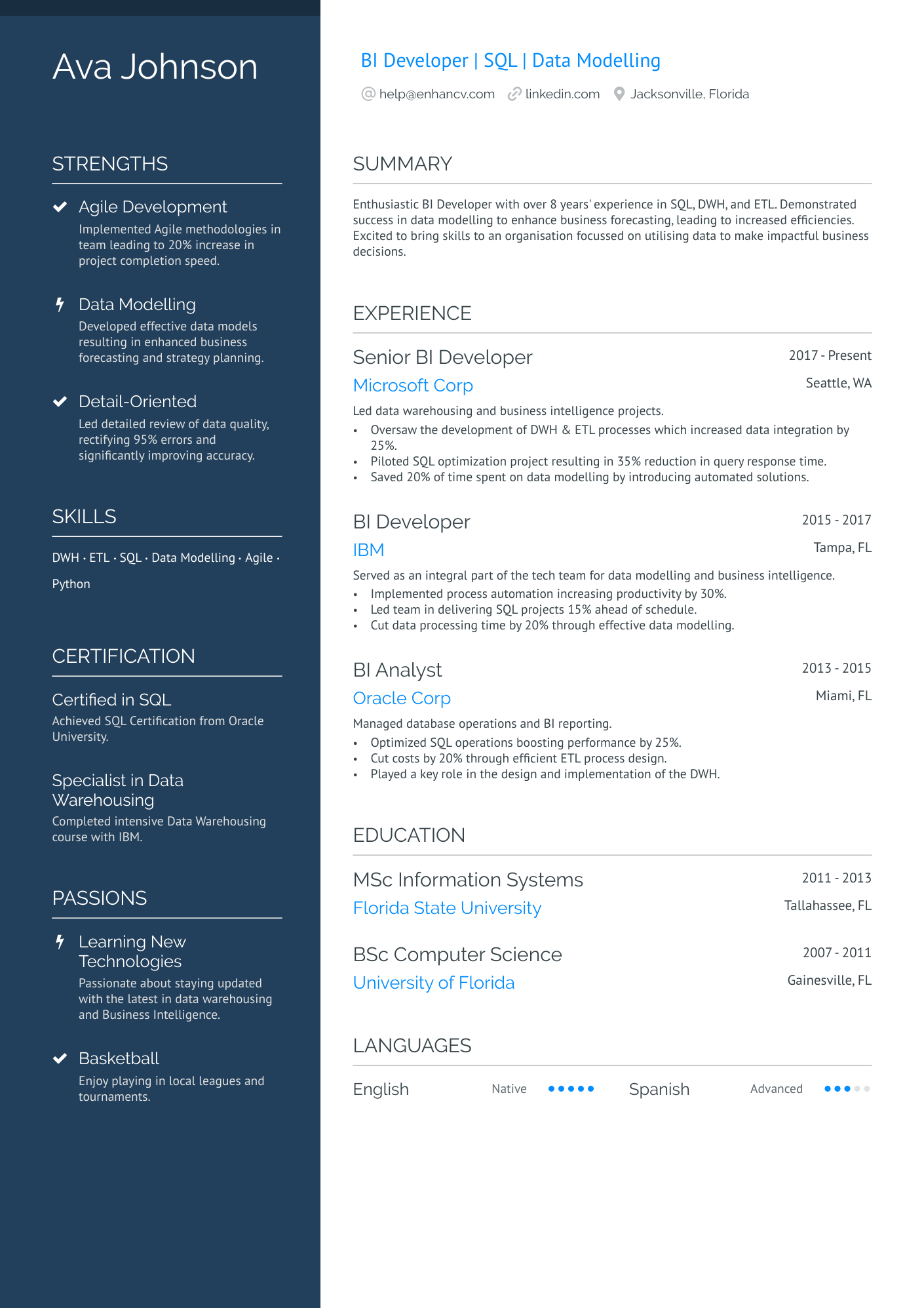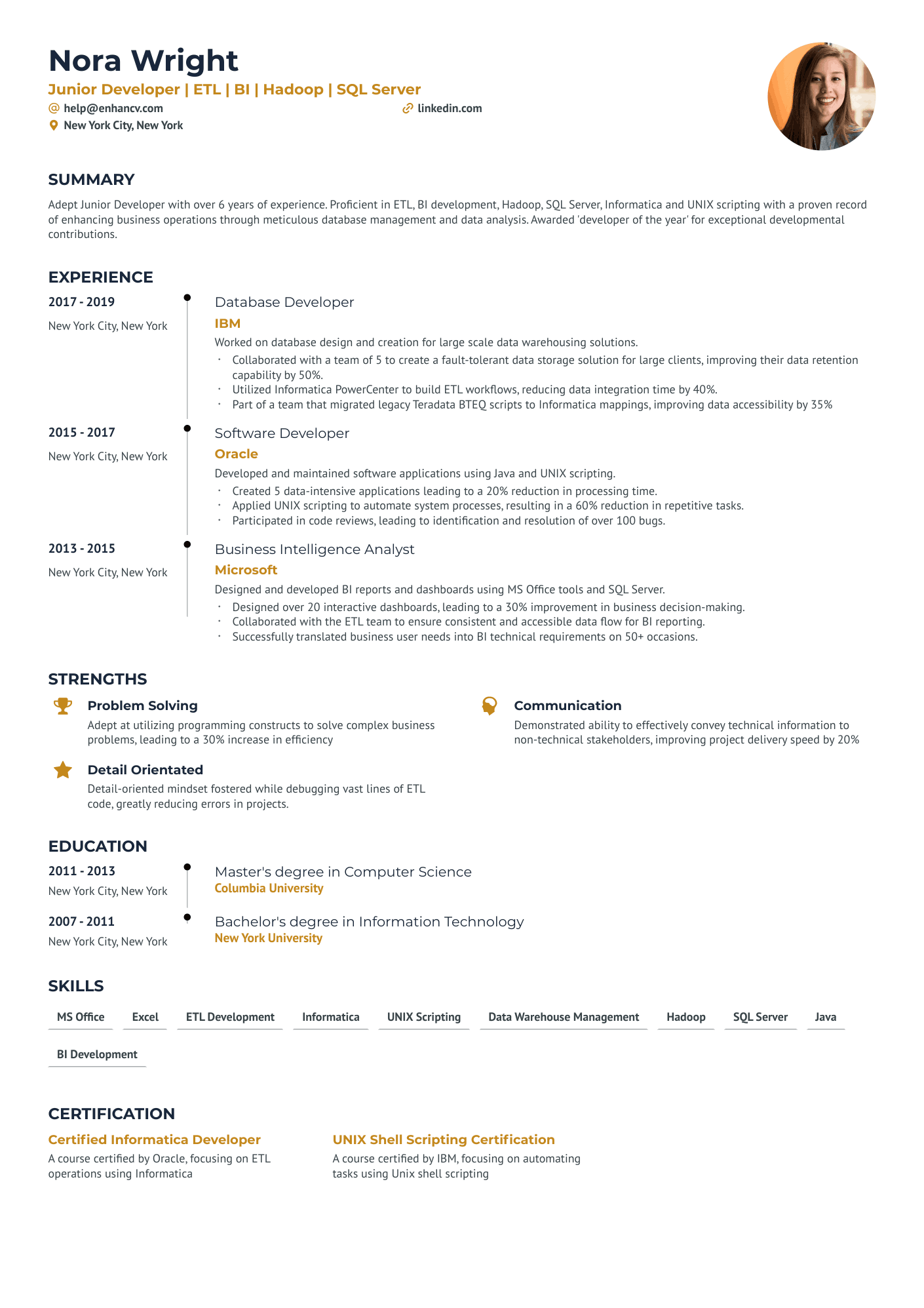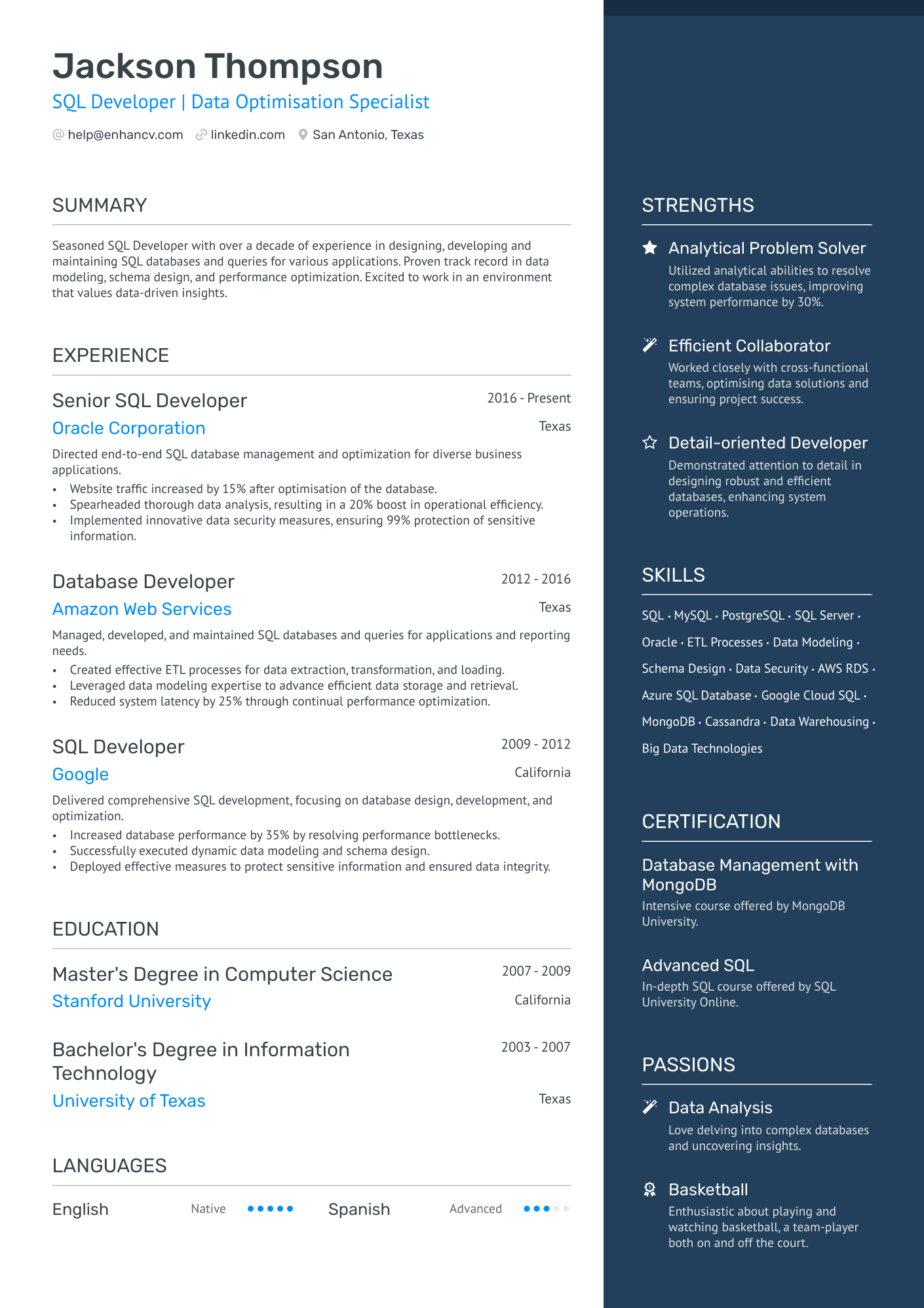Many ETL developer resume submissions fail because they list tools and tasks but skip measurable data pipeline outcomes. That hurts during ATS screening and fast recruiter scans, where dense, generic entries blend into a crowded field. Knowing how to make your resume stand out is essential in such a competitive landscape.
A strong resume shows what you delivered and why it mattered. Highlight reduced load times, improved data quality, cut failures, scaled throughput, met service-level agreements, migrated terabytes, enabled faster reporting, and supported key decisions. Quantify scope, reliability, and business impact.
Key takeaways
- Quantify pipeline outcomes like runtime, error rates, and cost savings in every experience bullet.
- Tailor tools, platforms, and terminology to match each job posting's exact requirements.
- Use reverse-chronological format for experienced ETL developers and hybrid format for career switchers.
- Place skills above experience on junior resumes so recruiters and ATS catch technical fit fast.
- Demonstrate skills through measurable results in your summary and experience, not just a list.
- Build project entries around a clear problem, technical approach, and measurable outcome.
- Use Enhancv to turn vague ETL job duties into specific, recruiter-ready resume bullets.
How to format a ETL developer resume
Recruiters evaluating ETL developer resumes prioritize hands-on experience with data integration tools, pipeline architecture, and measurable improvements to data quality or processing efficiency. A clean, well-structured format ensures these signals surface quickly during both automated screening and manual review. Choosing the right resume format is one of the most important early decisions you'll make.
I have significant experience in this role—which format should I use?
Use a reverse-chronological format to present your ETL development career in a clear, linear progression that highlights growing technical ownership and pipeline complexity. Do:
- Lead each role entry with the scope of your data environments—volume, source diversity, number of downstream consumers, and cross-functional collaboration.
- Emphasize core tools and platforms (Informatica, Talend, SSIS, Apache Airflow, Spark, AWS Glue, dbt) alongside the data warehousing and modeling methodologies you've applied.
- Quantify outcomes tied to pipeline performance, data accuracy, cost reduction, or processing speed improvements.
I'm junior or switching into this role—what format works best?
A hybrid format works best because it lets you lead with relevant ETL and data engineering skills while still showing concrete experience in a structured timeline. Do:
- Place a focused skills section near the top featuring SQL, Python, specific ETL tools, and data modeling concepts so applicant tracking systems and recruiters see your technical fit immediately.
- Include personal projects, internships, or transitional work—such as building data pipelines for open datasets or migrating legacy reports—to demonstrate hands-on ETL capability.
- Connect every action to a measurable or observable result, even at a small scale.
Why not use a functional resume?
A functional format strips away the timeline and context recruiters need to evaluate how your ETL skills were applied in real production environments, making it harder to verify hands-on proficiency with specific tools and data volumes.
- A functional resume may be acceptable if you're transitioning from a database administration or data analyst role into dedicated ETL development and lack dedicated ETL job titles—but only if you tie every listed skill to a specific project, pipeline, or measurable outcome rather than presenting skills in isolation.
With your resume's structure and layout established, the next step is determining which sections to include so each one reinforces your qualifications as an ETL developer.
What sections should go on a ETL developer resume
Recruiters expect a clear, end-to-end view of the data pipelines you've built, the systems you've integrated, and the results you've delivered. Understanding which resume sections to include ensures nothing critical is missing.
Use this structure for maximum clarity:
- Header
- Summary
- Experience
- Skills
- Projects
- Education
- Certifications
- Optional sections: Awards, Open-source work, Languages
Strong experience bullets should emphasize measurable pipeline impact, reliability improvements, performance gains, data quality outcomes, and the scope of platforms, volumes, and stakeholders you supported.
Is your resume good enough?
Drop your resume here or choose a file. PDF & DOCX only. Max 2MB file size.
Now that you’ve set up the key resume components, focus next on writing your ETL developer resume experience to show how your work delivers results.
How to write your ETL developer resume experience
Your work experience section should highlight ETL pipelines you've built, optimized, or delivered into production—along with the specific tools, data platforms, and integration methods you used to achieve measurable results. Hiring managers prioritize demonstrated impact on data quality, processing speed, and system reliability over descriptive task lists.
Each entry should include:
- Job title
- Company and location (or remote)
- Dates of employment (month and year)
Three to five concise bullet points showing what you owned, how you executed, and what outcomes you delivered:
- Ownership scope: the data pipelines, warehouse environments, integration layers, source systems, or data domains you were directly accountable for as an ETL developer.
- Execution approach: the ETL frameworks, scripting languages, scheduling tools, database platforms, or data modeling techniques you applied to extract, transform, and load data across environments.
- Value improved: changes to pipeline performance, data accuracy, load times, error rates, scalability, or operational reliability that resulted from your ETL work.
- Collaboration context: how you partnered with data engineers, analysts, database administrators, business intelligence teams, or stakeholders to define transformation logic, resolve data quality issues, or align pipeline output with reporting needs.
- Impact delivered: outcomes tied to faster data availability, reduced processing failures, improved downstream reporting accuracy, or successful migrations—expressed through results and scale rather than activity descriptions.
Experience bullet formula
A ETL developer experience example
✅ Right example - modern, quantified, specific.
ETL Developer
NorthBridge Health Analytics | Remote
2022–Present
Built and scaled data pipelines for a healthcare analytics platform supporting 150+ provider groups and daily operational reporting.
- Architected and maintained ETL pipelines in AWS Glue (Apache Spark) and Python, ingesting 1.2 billion rows per month from S3, PostgreSQL, and third-party application programming interfaces, cutting end-to-end load time by 38 percent.
- Implemented data quality checks with Great Expectations and dbt tests, reducing failed downstream dashboards by 62 percent and improving SLA adherence from 93 percent to 99.5 percent.
- Optimized Snowflake warehouse performance by redesigning clustering keys, materialized views, and incremental loads, lowering compute spend by 21 percent while improving key query latency from nine minutes to under three minutes.
- Partnered with data analysts, product managers, and engineering to define metrics and source-of-truth tables, delivering a curated semantic layer that reduced ad hoc request turnaround time by 35 percent.
- Automated orchestration and monitoring using Apache Airflow, CloudWatch, and PagerDuty, decreasing pipeline incident response time by 44 percent and eliminating recurring failures caused by schema drift through contract-based validations.
Now that you've seen how a strong experience section comes together, let's look at how to adjust those details to match the specific job posting you're targeting.
How to tailor your ETL developer resume experience
Recruiters evaluate your ETL developer resume through applicant tracking systems and manual review, so alignment with the job posting is critical. Tailoring your resume to the job description ensures the tools, processes, and outcomes you highlight match what the hiring team prioritizes.
Ways to tailor your ETL developer experience:
- Match the exact ETL tools and platforms listed in the job posting.
- Mirror the database technologies and data warehouse systems they specify.
- Use the same terminology for data integration or migration methodologies.
- Reflect pipeline performance or data quality KPIs the role emphasizes.
- Include industry or domain experience when the posting names a sector.
- Highlight data governance or compliance standards referenced in requirements.
- Align your workflow descriptions with their scheduling or orchestration frameworks.
- Emphasize collaboration with analytics or engineering teams if the role requires it.
The goal is to align your real accomplishments with each job's stated requirements, not to force keywords where they don't belong.
Resume tailoring examples for ETL developer
| Job description excerpt | Untailored | Tailored |
|---|---|---|
| "Design and maintain ETL pipelines using Apache Airflow and AWS Glue to process large-scale healthcare datasets in compliance with HIPAA regulations." | Worked on data pipelines and helped move data between systems. | Designed and maintained ETL pipelines using Apache Airflow and AWS Glue, processing 12M+ daily healthcare records while enforcing HIPAA-compliant data handling across all transformation layers. |
| "Build reusable Informatica PowerCenter mappings to integrate data from SAP, Salesforce, and Oracle ERP into a Snowflake data warehouse, supporting finance and supply chain reporting." | Created data mappings and loaded data into the warehouse for reporting purposes. | Built 40+ reusable Informatica PowerCenter mappings that integrated SAP, Salesforce, and Oracle ERP source data into Snowflake, cutting finance and supply chain report latency by 35%. |
| "Develop and optimize complex SQL-based transformations in Talend, implement SCD Type 2 logic, and ensure data quality through automated validation frameworks." | Wrote SQL queries and fixed data issues when they came up. | Developed and optimized 60+ SQL-based transformations in Talend with SCD Type 2 logic, reducing dimension load failures by 50% through an automated validation framework that flagged anomalies before production loads. |
Once you’ve aligned your experience with the role’s requirements, quantify your ETL developer achievements to prove the impact of that work.
How to quantify your ETL developer achievements
Quantifying your work proves business impact beyond code. Focus on pipeline runtime, data freshness, failure rates, data quality, cloud costs, and delivery speed across tools like Airflow, dbt, Spark, and Snowflake. Learning how to effectively use numbers on your resume can transform vague duties into compelling proof of value.
Quantifying examples for ETL developer
| Metric | Example |
|---|---|
| Performance | "Cut nightly ETL runtime from 3.8 hours to 1.9 hours by tuning Spark partitions and Snowflake warehouse sizing." |
| Reliability | "Reduced pipeline failures from 6% to 1.2% by adding Airflow retries, idempotent loads, and automated rollback steps." |
| Data quality | "Improved valid-record rate from 97.1% to 99.6% using dbt tests, Great Expectations checks, and source-to-target reconciliations." |
| Cost efficiency | "Lowered monthly compute spend by 22% by scheduling autosuspend, right-sizing warehouses, and removing unused intermediate tables." |
| Delivery speed | "Shipped twelve new source integrations in eight weeks by templating connectors and standardizing CDC patterns with Kafka and Debezium." |
Turn vague job duties into measurable, recruiter-ready resume bullets in seconds with Enhancv's Bullet Point Generator.
Once you've crafted strong bullet points for your experience section, you'll want to apply that same precision to presenting your hard and soft skills.
How to list your hard and soft skills on a ETL developer resume
Your skills section shows you can build reliable data pipelines, and recruiters and an ATS (applicant tracking system) scan them to match you to the stack and responsibilities—aim for a hard-skill-heavy mix supported by role-specific soft skills.
ETL developer roles require a blend of:
- Product strategy and discovery skills.
- Data, analytics, and experimentation skills.
- Delivery, execution, and go-to-market discipline.
- Soft skills.
Your skills section should be:
- Scannable (bullet-style grouping).
- Relevant to the job post.
- Backed by proof in experience bullets.
- Updated with current tools.
Place your skills section:
- Above experience if you're junior or switching careers.
- Below experience if you're mid/senior with strong achievements.
Hard skills
- SQL, query optimization
- Python for data pipelines
- Apache Spark, Databricks
- dbt, data modeling
- Airflow, DAG orchestration
- Informatica PowerCenter, SSIS
- Snowflake, BigQuery, Redshift
- S3, Azure Data Lake Storage
- CDC, incremental loads
- Data quality checks, unit tests
- Git, CI/CD pipelines
- Dimensional modeling, star schema
Soft skills
- Translate requirements into mappings
- Clarify ambiguous source data
- Partner with analysts and engineers
- Communicate tradeoffs and timelines
- Document pipelines and data contracts
- Own incidents and root-cause analysis
- Prioritize reliability over shortcuts
- Review code and enforce standards
- Coordinate releases across teams
- Manage stakeholder expectations
- Ask precise, testable questions
- Drive alignment on definitions
How to show your ETL developer skills in context
Skills shouldn't live only in a bulleted list on your resume. Explore curated resume skills examples to see how top candidates present their technical abilities.
They should be demonstrated in:
- Your summary (high-level professional identity)
- Your experience (proof through outcomes)
Here's what that looks like in practice.
Summary example
Senior ETL developer with eight years of experience building scalable data pipelines in healthcare analytics. Proficient in SSIS, Python, and AWS Glue. Reduced data processing latency by 40% through pipeline optimization and cross-functional collaboration with engineering teams.
- Reflects senior-level expertise clearly
- Names industry-relevant tools specifically
- Leads with a measurable outcome
- Highlights cross-team collaboration skills
Experience example
Senior ETL Developer
Meridian Health Data Solutions | Remote
March 2019–Present
- Redesigned 12 legacy SSIS pipelines using Apache Airflow and Python, cutting nightly batch processing time by 55%.
- Partnered with data engineering and analytics teams to build a real-time ingestion layer in AWS Glue, supporting 3 million daily records.
- Implemented automated data quality checks with Great Expectations, reducing production data incidents by 70% within six months.
- Every bullet includes measurable proof
- Skills appear naturally through real outcomes
Once you’ve demonstrated your ETL developer skills through relevant examples and outcomes, the next step is applying that approach to a resume when you have no experience.
How do I write a ETL developer resume with no experience
Even without full-time experience, you can demonstrate readiness through projects and hands-on work. If you're writing a resume without work experience, focus on showcasing transferable skills and measurable project outcomes:
- Course ETL capstone project
- Personal data pipeline portfolio
- Internship data integration tasks
- Volunteer nonprofit reporting pipeline
- Open-source ETL pull requests
- Kaggle dataset transformation project
- Freelance data cleanup engagement
- SQL and Python lab assignments
Focus on:
- Clear ETL developer project scope
- SQL joins, window functions
- Data modeling and schema design
- Testing, logging, and monitoring
Resume format tip for entry-level ETL developer
Use a skills-based resume format because it highlights ETL developer projects, tools, and results when your work history is limited. Do:
- Put Projects above Work Experience.
- List ETL developer tools per project.
- Quantify rows, runtime, and errors.
- Include GitHub links to code.
- Match keywords to each job.
- Built an Airflow ETL developer pipeline using Python and PostgreSQL to load ten million rows nightly, cutting runtime from forty-five to eighteen minutes.
Your education section can do much of that heavy lifting, so let's look at how to present it effectively.
How to list your education on a ETL developer resume
Your education section helps hiring teams confirm you have the technical foundation for ETL developer work. It validates knowledge in databases, programming, and data systems quickly.
Include:
- Degree name
- Institution
- Location
- Graduation year
- Relevant coursework (for juniors or entry-level candidates)
- Honors & GPA (if 3.5 or higher)
Skip month and day details—list the graduation year only.
Here's a strong education entry tailored for an ETL developer resume.
Example education entry
Bachelor of Science in Computer Science
University of Wisconsin–Madison, Madison, WI
Graduated 2021
GPA: 3.7/4.0
- Relevant coursework: Database Systems, Data Warehousing, SQL Programming, Distributed Computing, Data Integration Architectures
- Honors: Dean's List (six semesters), Magna Cum Laude
How to list your certifications on a ETL developer resume
Certifications on your resume show an ETL developer's commitment to learning, prove hands-on tool proficiency, and signal industry relevance across cloud platforms, databases, and data integration practices.
Include:
- Certificate name
- Issuing organization
- Year
- Optional: credential ID or URL
- Place certifications below education when they are older, less relevant, or you already have strong ETL developer experience and recent projects.
- Place certifications above education when they are recent and highly relevant, or when you are changing roles and need quick ETL developer credibility.
Best certifications for your ETL developer resume
- AWS Certified Data Engineer – Associate
- Microsoft Certified: Azure Data Engineer Associate
- Google Cloud Professional Data Engineer
- Databricks Certified Data Engineer Associate
- SnowPro Core Certification
- Informatica Certified Professional: Data Integration and Application Integration
Once you’ve positioned your credentials to validate your ETL expertise, focus on how to write your ETL developer resume summary to connect that proof to the impact you deliver.
How to write your ETL developer resume summary
Your resume summary is the first thing a recruiter reads. A strong one instantly signals you have the ETL skills and experience worth exploring further.
Keep it to three to four lines, with:
- Your title and total years of hands-on ETL development experience.
- The domain or industry you've worked in, such as finance, healthcare, or e-commerce.
- Core tools and technologies like Informatica, SSIS, Talend, Apache Airflow, SQL, or Python.
- One or two measurable achievements, such as pipeline performance gains or data processing volumes.
- A relevant soft skill tied to a real outcome, like cross-team collaboration that shortened delivery cycles.
PRO TIP
At the junior or mid level, lead with your strongest technical skills and the tools you've used in real projects. Highlight early wins like improving load times or automating manual processes. Avoid vague phrases like "passionate data enthusiast" or "eager fast learner." Recruiters want specifics, not motivation statements.
Example summary for a ETL developer
ETL developer with three years of experience building pipelines in Informatica and SQL for healthcare data platforms. Reduced nightly batch processing time by 40% through query optimization and parallel loading strategies.
Optimize your resume summary and objective for ATS
Drop your resume here or choose a file.
PDF & DOCX only. Max 2MB file size.
Now that your summary effectively showcases your ETL expertise and value, make sure the header framing it presents your professional details accurately and clearly.
What to include in a ETL developer resume header
A resume header lists your key identity and contact details, helping ETL developer candidates improve visibility, build credibility, and pass recruiter screening fast.
Essential resume header elements
- Full name
- Tailored job title and headline
- Location
- Phone number
- Professional email
- GitHub link
- Portfolio link
Including a LinkedIn link lets recruiters verify titles, dates, and skills quickly, which supports faster screening.
Don't include a photo on a ETL developer resume unless the role is explicitly front-facing or appearance-dependent.
Match your header job title to the posting and add a specific ETL developer headline that reflects your core tools and domain.
Example
ETL developer resume header
Jordan Taylor
ETL developer | SQL, Python, and Airflow | Data warehouse pipelines
Austin, TX
(512) 555-01XX
your.name@enhancv.com
github.com/yourname
yourwebsite.com
linkedin.com/in/yourname
Once your contact details and role identifiers are set at the top, add the following optional resume sections to strengthen your ETL developer profile with relevant supporting information.
Additional sections for ETL developer resumes
When your core experience looks similar to other candidates, additional sections help you stand out with role-specific credibility and technical depth. For example, listing language skills can be a differentiator when working with international data teams or global organizations.
- Languages
- Certifications (AWS, Azure, Informatica, or Talend)
- Technical publications or blog contributions
- Open-source ETL project contributions
- Data engineering conferences and speaking engagements
- Professional memberships (DAMA International or similar organizations)
- Hobbies and interests
Once you've strengthened your resume with relevant additional sections, it's worth pairing it with a well-crafted cover letter to make an even stronger impression.
Do ETL developer resumes need a cover letter
An ETL developer resume doesn't require a cover letter, but it helps in competitive searches or when hiring teams expect one. If you're unsure where to start, understanding what a cover letter is and how it complements your resume can help you decide. It can make a difference when your experience needs context, or when you match a specific domain.
Use a cover letter to add context your ETL developer resume can't show:
- Explain role and team fit by matching your ETL developer strengths to the stack, data volumes, and collaboration style.
- Highlight one or two projects with outcomes, such as faster loads, improved data quality, lower costs, or higher pipeline reliability.
- Show you understand the product and users by connecting your ETL work to reporting needs, customer workflows, or business decisions.
- Address transitions or non-obvious experience by mapping past work to ETL developer requirements, including tools, patterns, and ownership scope.
Drop your resume here or choose a file.
PDF & DOCX only. Max 2MB file size.
Even if you decide a cover letter won’t add much beyond your resume, using AI to improve your ETL developer resume is the next step to sharpen your content and align it with the role.
Using AI to improve your ETL developer resume
AI can sharpen your resume's clarity, structure, and impact. It helps tighten language and highlight measurable results. But overuse strips authenticity. Once your content is clear and role-aligned, step away from AI. If you're curious about where to start, explore ChatGPT resume writing prompts designed to improve each section of your resume.
Here are 10 practical prompts to strengthen specific sections of your ETL developer resume:
- Sharpen your summary. "Rewrite my ETL developer resume summary to highlight pipeline design skills and measurable data processing improvements in three sentences or fewer."
- Quantify experience bullets. "Add specific metrics like processing volume, error reduction, or runtime improvement to each ETL developer experience bullet on my resume."
- Align skills section. "Compare my ETL developer skills section against this job description and flag missing tools, platforms, or languages I should add."
- Strengthen action verbs. "Replace weak or generic verbs in my ETL developer experience bullets with strong, specific action verbs tied to data engineering tasks."
- Tighten project descriptions. "Rewrite my ETL developer project descriptions to clearly state the business problem, technical approach, and measurable outcome in two lines each."
- Remove redundancy. "Identify and remove repeated or overlapping phrases across all sections of my ETL developer resume without losing key details."
- Improve certification relevance. "Reorder and contextualize the certifications on my ETL developer resume to emphasize those most relevant to this target role."
- Clarify education entries. "Rewrite the education section of my ETL developer resume to highlight relevant coursework, capstone projects, or data-related research."
- Tailor for ATS. "Identify important keywords from this job posting and naturally incorporate them into my ETL developer resume's summary and experience sections."
- Cut filler language. "Remove all vague, generic, or filler phrases from my ETL developer resume and replace them with specific, concise statements."
Stop using AI once your resume sounds accurate, specific, and aligned with real experience. AI should never invent experience or inflate claims—if it didn't happen, it doesn't belong here.
Conclusion
A strong ETL developer resume shows measurable outcomes, role-specific skills, and a clear structure. It ties your work to faster pipelines, higher data quality, lower costs, and fewer failures, using specific numbers.
Keep each section easy to scan, and match your skills to the role. This approach shows you can deliver reliable ETL work now and adapt to near-future hiring needs.
